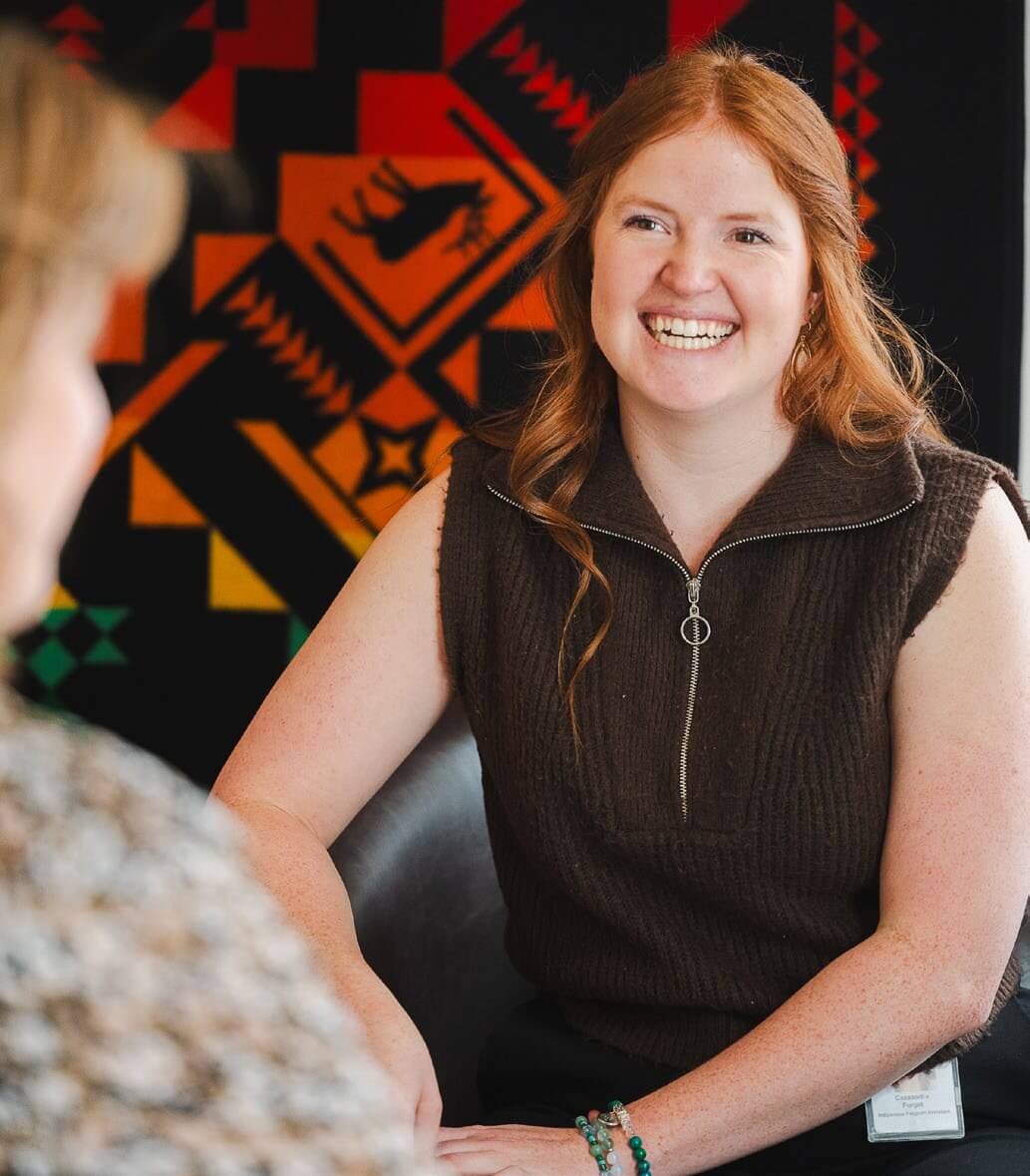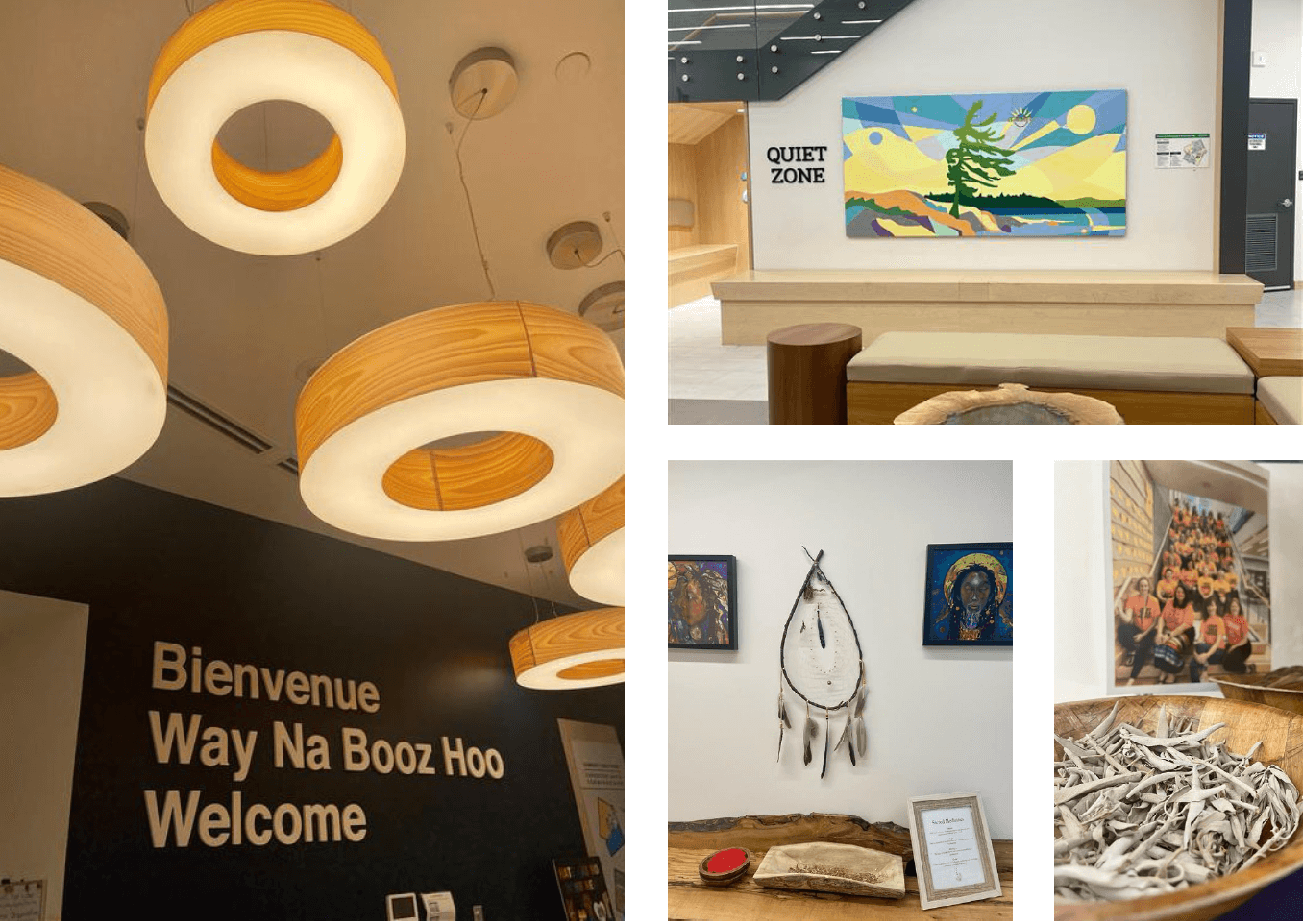Cassandra Forget’s journey into social work is a powerful blend of personal experience and a deep commitment to mental health. As the Indigenous Social Worker at Chigamik Community Health Centre (Chigamik) in Midland, Ontario, Cassandra’s practice bridges Indigenous traditions with modern social work practices, offering a unique and compassionate approach that resonates with the needs of the people she serves. “It’s about offering a safe place to talk about mental health and not feeling alone,” Cassandra explains, highlighting her commitment to the field. Chigamik serves the large population of First Nation, Métis and Francophone communities in the region.
FROM PERSONAL CHALLENGES TO PROFESSIONAL ACHIEVEMENTS

Cassandra’s early life exposed her to the mental health struggles faced by those around her, including friends and family. Recognizing the lack of safe spaces for open discussion about mental health, she was inspired by her mother and sister, both of whom are dedicated to mental health services. Their influence guided Cassandra toward a career in social work, beginning with a social service worker diploma from Fleming College and later completing a bachelor’s degree in social work from Lakehead University.
Cassandra’s personal challenges became the foundation for her professional achievements. Over the past seven years at Chigamik, she has expanded her role beyond traditional counseling to include group programs, community events and outreach efforts that focus on the needs of Indigenous people along the shores of Georgian Bay.
COLLABORATING IN A MULTI-DISCIPLINARY ENVIRONMENT
At Chigamik, Cassandra works within a multi-disciplinary team, collaborating with doctors, nurses and other health professionals to provide holistic care. This shared setting presents unique challenges and opportunities, particularly in integrating Indigenous perspectives into everyday practice. Cassandra is actively involved in an Indigenous committee that ensures cultural traditions are central to the centre’s operations. One initiative that Cassandra is particularly proud of is “Tiny Teachings,” where staff share cultural insights and updates to deepen their understanding of providing culturally safe care. This initiative is just one example of how Cassandra works to embed Indigenous knowledge into the daily work at Chigamik. Cassandra also highlights the importance of client confidentiality, noting that, “It’s getting that consent from your client in knowing their comfortability with their personal information,” while appreciating the benefits of streamlined referrals and data sharing.
EMBRACING INDIGENOUS CULTURE IN PRACTICE
Cassandra’s Métis heritage plays a vital role in her approach to social work. She regularly incorporates traditional practices like smudging into her sessions to cultivate a positive and grounded environment. “Smudging is something I offer regularly in both individual and group sessions,” she says. Cassandra is committed to respecting the diverse needs of her clients, ensuring that even those who do not follow Indigenous traditions find suitable paths to care. “Some clients might not practise Indigenous traditions, so I work with them to find what suits them best,” she notes.
Cassandra also approaches client care by using the wellness wheel to address various dimensions of clients’ lives: mental, emotional, physical, spiritual, social, environmental and financial. This key tool empowers clients to achieve a balanced sense of well-being.

TRUST AND COMMUNITY CONNECTION
For Cassandra, building trust is at the heart of her practice. She understands the challenges of seeking help and strives to create a welcoming environment. “Just getting someone through the door can be a big step,” she acknowledges. Whether it’s through phone calls, in-person sessions or even a walk outside, Cassandra meets clients where they are. This adaptability creates a welcoming environment that ensures clients feel seen and supported from the moment they arrive at Chigamik.
LOOKING TO THE FUTURE OF COMMUNITY HEALING
Cassandra envisions a future where social work emphasizes the power of community. “Your healthcare is very important, but it doesn’t have to be so daunting and heavy and scary,” she says, imagining a world where healthcare providers are deeply integrated into the fabric of their communities. Her passion for restoring community connections, especially in the aftermath of the COVID-19 pandemic, drives her vision for the future. “I would want to get our community back together again. Restore a lot of those relationships, restore a lot of those partnerships,” she expresses.
Through her work at Chigamik, Cassandra Forget is not only providing compassionate, culturally respectful care but also advancing a holistic, adaptable approach to mental health and community healing. Her dedication to integrating Indigenous traditions with modern practices is paving the way for a more empathetic and inclusive future in social work, one where community and connection are at the core of care.
The College thanks Cassandra for speaking with us and sharing her experiences. In appreciation, the College has made a donation to Chigamik Community Health Centre.

Photos taken at Chigamik Community Health Centre

